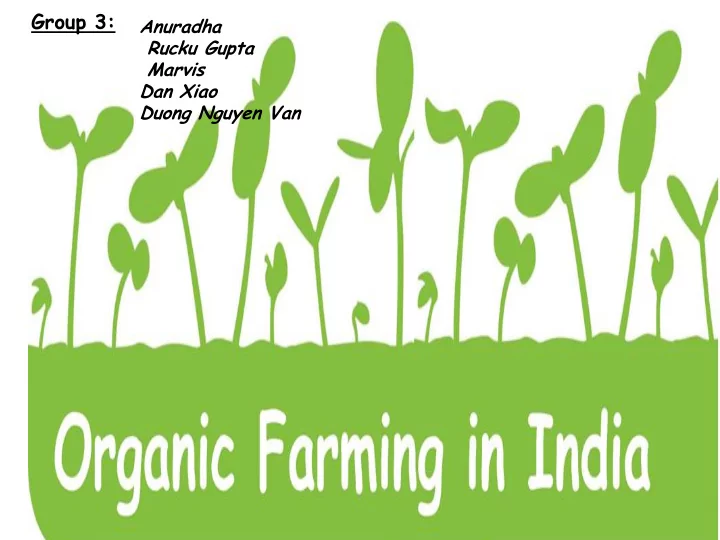

Group 3: Anuradha Rucku Gupta Marvis Dan Xiao Duong Nguyen Van
Introduction Agriculture has been the basic source for the subsistence of man for thousand of years. Even today, it provides livelihood to half of the worlds population. India succeeded in green revolution with introduction of high yielding varieties of various crops and use of fertilizers, pesticides and other inputs. Extensive use of inputs has not only deteriorated the soil, water and environment but also caused injury to human. Threats of modern Indian agriculture Dependency on synthetic chemical fertilizers Increase in secondary and micronutrient deficiencies Increase in pesticide use Reduction in productivity Reduction in quality of produce Environmental pollution
ORGANIC FARMING As per the definition of (USDA) “organic farming is a system which avoids or largely excludes the use of synthetic inputs (such as fertilizers, pesticides, hormones, feed additives etc) and to the maximum extent feasible rely upon crop rotations, crop residues, animal manures, off-farm organic waste, and biological system of nutrient mobilization and plant protection A system of farm design and management to create an ecosystem, which can achieve sustainable productivity without the use of artificial external inputs such as chemical fertilizers and pesticides.
Agronomic techniques Crop residue Organic manures Bio-fertilizers Vermicompost (1-1.5% N, 0.6-0.8% P, 1.2-1.5% K.) Bio-pesticides 4
Principles of Organic Farming
Organic Farming : Avoids Synthetically compounded fertilizers Pesticides Growth regulators
India Organic Logo
Present status of Organic Farming in India India ranks : - 23 rd in area under organic cultivation - 88 th in ratio of agriculture land under organic crops to total farming area MP and MH - organic states in India Sikkim – First fully organic state (GOI, 2015) APEDA (2013-14 )
Present status of Organic Farming in India India exported 135 products (2013-2014). Area under certified organic farming - >2.55 m ha. (However, non-certified area is much more than certified area in the country) Total production - 586,000 tons The organic agri export to US, European Union, Canada,... : 403 million $ including 183 US $ organic textiles registering a 7.73% growth APEDA (2013-14 )
Organic products in India
Major products produced in India by Organic Farming Type Products Commodity Tea , Coffee, Rice, Wheat Spices Cardamom, Black pepper, white pepper, ginger, turmeric, vanilla, mustard, tamarind, clove, cinnamon, nutmeg, mace chilly Pulses Red Gram, Black Gram Fruits Mango, Banana , Pineapple, Grape, passion fruit, Orange, Cashew nut, walnut Vegetables Okra, Brinjal, Garlic, Onion, Tomato, Potato Oilseeds Sesame, castor, sunflower Others Cotton, herbal extract
Area identified for organic farming in India- - Organic agriculture in : + wetlands + protected forest areas + biological corridors + Vegetables and Plantation crops + Hilly areas of North-east and Western ghats + Rained areas
Indian Organic Farming Market Opportunities • The UK, Netherlands, and Germany have a high demand for organic mangoes, grapes which could be exploited by India. • India targets the processed organic banana, pineapples with focus on the geographically closer to Japan and EU. (via Indian Council of Food and Agriculture)
Indian Organic Farming Market Opportunities • Indian organic vegetable and tea producers are in a high position to expand their market in the EU, Australia, and Singapore.
Indian Organic Farming Market Challenges • As organic farming prohibits synthetic pesticides, the vulnerable farmer is at the mercy of severe attacks from mutant pests. • An shortage of effective and viable methods of organic pest control. (Indian Council of Food and Agriculture Organic Farming: Market Update)
Indian Organic Farming Market Challenges • Poor road infrastructure especially in the hilly States, results in poor and delayed connectivity to farmer markets. • Inadequate agricultural infrastructure and cold storage facilities translate to loss of produce due to spoilage.
Indian Organic Farming Market Recommendations design the training program and • implement the same to impart required skills to the organic farmers through KVKs. Farmers must also be educated about the • certification process to facilitate certification. The infrastructure needs to be • created to promote organic agriculture (Indian Council of Food and Agriculture Organic Farming )
Indian Organic Farming Market Recommendations • Strong market support • A precise mechanism needs to be devised to ensure that the higher price paid by consumers should reach the farmers • Regulations for sale of organic products certified through accredited certification bodies should be notified under the Food Safety and Standards Act.
Indian Organic Farming Market Recommendations • Providing subsidies to compensate farmers for yield losses during the conversion period from conventional to organic farming as given by countries such as the UK • Promoting organic clusters and agri-zones from which global buyers can source organic produce. (Organic Farming in India- Status, issues and way forward)
Indian Organic Farming Market Recommendations - Providing access to equipment (such as nets, and polyhouses), good quality organic seeds and other inputs - Promoting research and development in organic seeds and inputs - Banning harmful pesticides and fertilizers that have been banned in developed countries (Organic Farming in India- Status, issues and way forward)
Conclusions • A large chunk of area in India, being organic by default, can be brought under certified organic crop production. • Organic produce has better quality than traditionally grown produce. • A wide array of choices are available for efficient nutrient and pest management under organic farming. • India is the emerging player in the world organic production, promotion and in export.
Recommend
More recommend